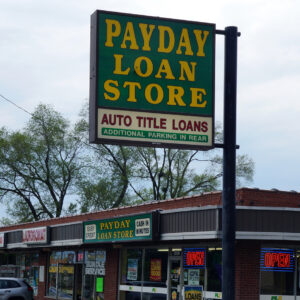Minority women are leading the entrepreneurial revolution. Instead of finding ways to help these women gain access to cash for capital or to meet financial challenges that arise, Kansas and Illinois are imposing financial hurdles for women of color in their states. Lawmakers are advancing legislation to artificially cap consumer loan rates, a move that will hurt financial wellness and slash access to capital for those of us who already have a hard enough time getting credit when we need it.
These bills are advertised as a common-sense approach to what is falsely labeled the “predatory” short-term lending market, in which consumers borrow a relatively small amount of money for a relatively short period of time, for example, $750 for six months.
In Kansas, a bill would cap loan rates at 36 percent but allow lenders to charge hidden fees and attach unneeded products like insurance to loans, which would result in consumers being charged up to 196 percent in interest and fees without disclosing them in loan APR documents.
This practice, known as “loan stuffing,” places borrowers at risk of financial harm. Working moms, for example, who do not have time to read the fine print on a loan agreement, although they should, may discover that their loan will cost five times what they thought. How does this make them better off? At least the short-term lenders in Kansas today are upfront about their fees.
There are reasons that short-term loan products are substantially more expensive than loans from a bank. First, it is expensive for banks to offer such small loans. Second, offering unsecured financial products to economically fragile consumers, who don’t have a perfect track record, is a big risk. They have to be able to cover the costs associated with making risky loans or they simply won’t offer them.
Short-term loans are extremely important to minority communities across America because they are frequently our only available source of credit. According to the FDIC, small-dollar borrowers tend to be “lower-income households, less-educated households, younger households, Black and Hispanic households, working-age disabled households, and households with volatile income.” Minorities are disproportionately unbanked or lack access to traditional banking services, which is why they rely on small-dollar loans and alternatives. Many Black and Hispanic people believe that big banks are not here to help them, so they look elsewhere to meet their personal and small business credit needs.
In theory, rate caps save consumers money by limiting the amount of interest an alternative lender can charge. But in practice, such laws force small-dollar loan lenders out of business, and in doing so expose consumers to greater financial risk and force underbanked minorities to use more costly alternatives that will leave them even worse off financially.
This is what happened in states that have enacted rate cap bills. According to the Federal Reserve Bank of New York, after enacting a rate cap in Georgia, borrowers bounced more checks, complained more about lenders and debt collectors, and were more likely to file for Chapter 7 bankruptcy. After Oregon capped interest rates, “former payday loan users shifting partially into plausibly inferior substitutes,” which came with the deterioration of the overall financial health of Oregonians. Bounced checks are concerning because non-sufficient funds fees can carry APRs of up to 10,000 percent–that’s a far worse deal than short-term loans.
Some people choose to use a pawn shop or sell valuable possessions. Others will get a loan secured by an auto title, which is less expensive but carries the risk of defaulting on the loan that could result in car repossession. Many minority borrowers are wary of taking this risk because they rely on their cars to supplement their incomes or earn a living through ride-hailing, delivery, and personal services, for example. Black women shouldn’t be forced to sell their grandmother’s heirlooms, lose a vehicle, or quit side gigs to meet their basic financial needs during a crisis.
The stories of hardships that people who can’t get loans and have to turn to these alternatives are compelling. Curiously, many of the same groups who advocate for rate caps are compiling such victim stories, but they ignore or don’t realize that these rate cap bills actually harm the people they are supposed to help by taking away options.
Rate caps aren’t the way to help minorities gain access to capital, as they make people worse off. States would do well to avoid them. Lawmakers across the country and in Washington D.C. should reject interest rate caps in favor of addressing the underlying financial inequality that creates the need for short-term credit in the first place. Reducing the supply of safe credit options does nothing to address demand. Capping interest rates will only erode more of the Black community’s resources, not promote our economic equity.

